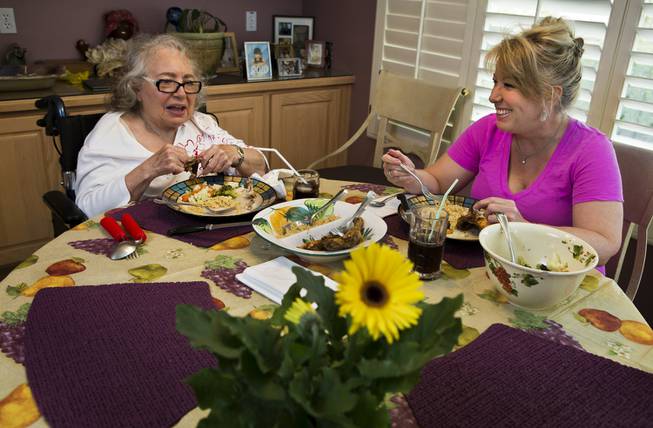
Judith Radford and her daughter Caryn Sanders eat dinner together most nights since Sanders moved to Las Vegas.
Sunday, July 26, 2015 | 2 a.m.
When Caryn Sanders’ stepfather died in October, she quit her teaching job, packed up her belongings and headed to Las Vegas.
Good for everyone
The benefits of family meals aren’t just for seniors.
Children who regularly eat dinner with relatives tend to eat more fruits, vegetables, fiber and calcium-rich foods and less junk food than children who don’t, a review of dozens of health studies by researchers at Rutgers University found. Similarly, teens who share meals with family members show fewer signs of depression and report feeling more supported than their peers.
Family meals also provide an opportunity for older generations to share values, culture and traditions with younger generations.
Sanders moved in with her 79-year-old mother, Judith Radford, who has Parkinson’s disease, limited mobility and mild dementia, which prevent her from living alone.
After years of living apart, the mother and daughter now share meals like when Sanders was a child. The family always sat down for dinner together, despite the hectic schedules of two working parents.
“I think the best time is when we reminisce,” Sanders, 49, said. “Sometimes she will open up to me and talk.”
Regular dinners among elderly parents and their children, however, are not the norm in America. A national survey by senior care company Home Instead found 73 percent of people dine with their elderly loved ones only on special occasions and holidays. Twenty percent of people with senior relatives living nearby never eat dinner with them, according to the study.
The survey’s results served as catalyst for the Sunday Dinner Pledge — an online commitment people can make pledging to eat dinner with their elderly relatives at least once a month. For every pledge received, Home Instead Senior Care will donate $1 to Meals on Wheels, up to $25,000.
“The whole idea of the program is to revive mealtime traditions with their seniors,” said Bonnie Reppert, a franchise owner of Home Instead Senior Care in Las Vegas. “When they have someone to eat with, they have a better experience, both nutritionally and emotionally.”
Kellee Lightfoot, a case manager at Catholic Charities in Las Vegas, sees seniors’ loneliness firsthand when she visits Meals On Wheels clients. They consistently express a desire to have more people in their lives, she said.
Many of the 1,489 Meals On Wheels clients in the valley live alone, and some don’t have relatives in the area, which makes their weekly interactions with meal-delivery drivers all the more important, Lightfoot said.
“They are always happy to see their driver,” she said. “They know their name.”
Multigenerational family dinners largely have fallen by the wayside as busy schedules and geography make it difficult for many extended families to share meals. But carving out time to eat with an elderly loved one benefits everyone at the table — particularly by building stronger bonds between the oldest and youngest generations, Reppert said.
Sanders agrees. She cherishes the nostalgic conversations she now shares with her mother.
“Take this time now,” Sanders said, “because you’re not going to get it back.”
Seniors say there are many benefits to sharing meals with their family and friends.
• 57 percent of people surveyed said the frequency of sit-down dinners with relatives had decreased since their childhood.
• 43 percent of people with senior relatives don’t think or don’t know whether their elderly loved ones eat nutritious and balanced meals every day.
• Two of five seniors who live alone show at least four warning signs of poor nutritional health.
Source: Home Instead

Join the Discussion:
Check this out for a full explanation of our conversion to the LiveFyre commenting system and instructions on how to sign up for an account.
Full comments policy